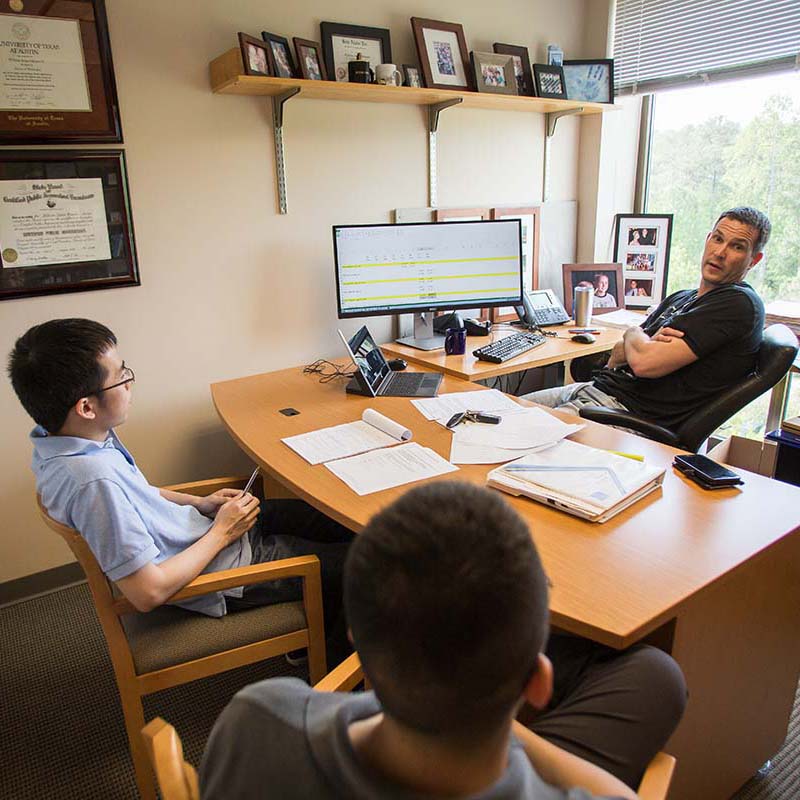Don’t tell Bill Mayew accounting is just a numbers game.
"I’m interested in communication that doesn’t necessarily come through in the numbers,” he said. “As soon as you get beyond the numbers, you’re talking about human beings communicating with other human beings, the stuff we deal with in everyday life. I’m just trying to measure that in the corporate world in a systematic way.”
Mayew’s work has led to novel findings that resonate far beyond the insular world of accounting, and has spurred action in politics and business. His study of racism in the higher education bond market, for example, saw two bills introduced in Congress to tackle the problem.
Mayew has also received attention for his work analyzing vocal inflections and word choice. He found vocal cues in earnings calls can help auditors detect fraud. He measured how a manager’s choice of words in annual reports can help predict whether a firm will go bankrupt. He revealed how women who use increasingly commonplace low-pitched, creaky vocalizations are judged as less competent, especially by other women.
"How firms communicate information can be just as important as the numbers.”
“Every discipline studies this, but it’s relatively new to accounting,” Mayew said. “Historically, accounting research has focused on earnings. But earnings are just a numerical representation of what’s going on inside a company. How firms communicate information can be just as important as the numbers.”
Much research in accounting tends to be data-driven archival work, or experimental studies using behavioral theories. Mayew said his professional background has helped him blend those approaches.
“Researchers tend to think in one of those two ways,” Mayew said, “but my research bridges those disciplines. I think this middle ground is a fertile area for new insights.”
His unusual perspective reflects the roundabout way Mayew came to academia. When young Bill got a scholarship to play basketball in college, his mother told him to pick a major that would pay the bills. Choose accounting, she told him, and he’d always be employed.
After college, Mayew followed the traditional path by joining one of the big four accounting firms – Ernst & Young – and did audits in the booming tech sector. During the slow summer months, he would teach new accounting standards and present accounting cases at conferences. Those experiences led him back to school for a Ph.D at the University of Texas at Austin, and ultimately to Fuqua.
“I like figuring things out and I like teaching,” he said, “so it made sense.”
Mayew’s experience is also a breeding ground for his research ideas.
“It leverages what I know, and you’ve got to play to your strengths to make an impact in research,” he said. “I have a lot of real world experience so I tend to gravitate toward things that I saw or talked about when I practiced accounting and they tend to be real, tangible things.”
Those conversations helped Mayew uncover racism in the higher education bond market. When bond traders told him they were having a harder time selling bonds from historically black colleges, Mayew investigated. He carefully ruled out other possible causes and concluded race was a factor.
That research spawned two bills in Congress to make it easier for historically black colleges to sell bonds and to access a federal financing program. It also prompted the U.S. Government Accountability Office to agree to investigate the barriers facing historically black colleges in financing capital projects.
Neither bill has yet become law, but Mayew remains optimistic, because a potential solution – lifting a current in-state limitation on the tax benefits of higher education bonds, allowing them to be sold nationwide – is politically popular and does not cost anything.
“That’s the one silver bullet,” he said.
Mayew also has research helping inform the Securities and Exchange Commission about how tightly to regulate managerial relationships with financial analysts.
“It’s just like in everyday life,” Mayew said. “We tend to get along better with people with whom we share viewpoints, whether it’s about the potential of a firm, or whether you like Chicago-style pizza or not.”
Except in accounting, too cozy a relationship can lead to investors getting bad advice. But if a firm talks to a friendly analyst, does that mean they’re fooling the stock market, or helping the market better understand their firm?
“It starts with a natural big question"
“I’m focused on how we figure out which one’s which,” Mayew said. He’ll follow the threads of that research wherever they lead.
“It starts with a natural big question,” he said. “And once you document evidence, it just leads to more questions, usually because there are alternative views about what the initial findings mean.”
Meanwhile, Mayew’s work on analyzing executive communications is continuing in what Mayew calls a natural progression. It remains particularly relevant as firms worry about public perception.
“Firms want to make sure they send the right message,” he said. “That’s what everyone is trying to manage.”
He’ll continue using his real-world experience and connections to guide his research.
“I like to bounce an idea off former colleagues or former students who now work on Wall Street to see if it makes real world sense,” he said. “You can do the math and lay down a model down but that doesn’t necessarily tell you if it passes the smell test in the real world.”
